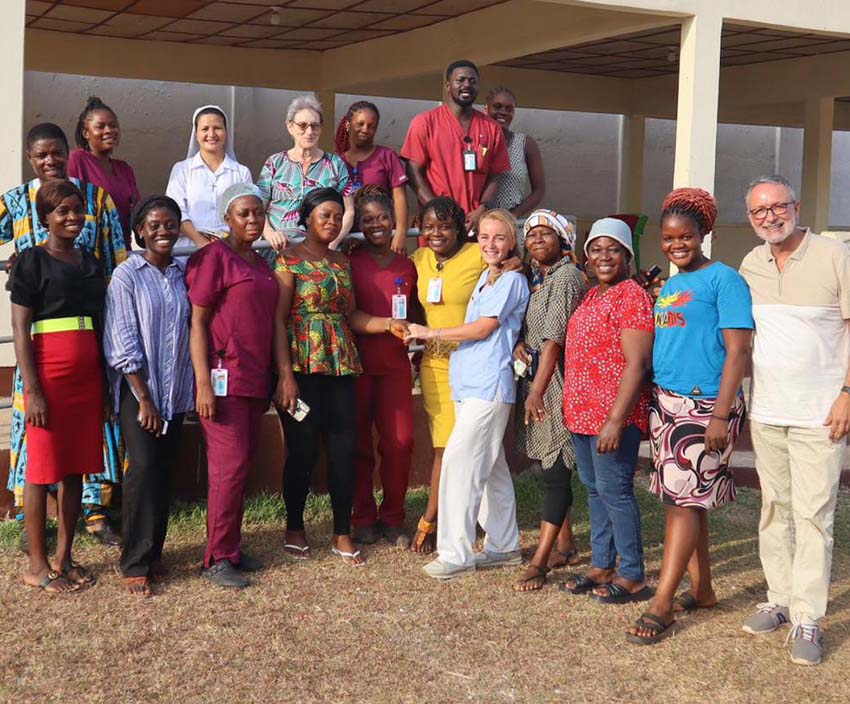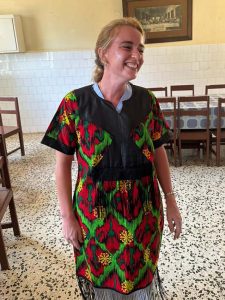
20 Mar Meet Cris, a volunteer nurse that stayed with us for 2 months
Cristina Bressel is a nurse from Madrid (Spain) who volunteered in our Mental Health Unit in January and February. She got her degree in Nursery in the Universidad Autonoma in Madrid and spiecialized in mental health nursery in the Hospital Universitario Fundacion Jimenez Diaz, where she did her residence period, as well. She has experience as general nurse in several units of the Hospital Universitario Puerta de Hierro and in several health centers, and volunteered during the Covid outbreak at the Hospital Universitario La Paz.
Why did you want to volunteer abroad?
I love travelling and meeting new cultures, and since I started studying nursing, I always wanted to volunteer in an African country, to share knowledge.
Why Liberia, and why the Benedict Menni Center?
The opportunity came through someone who put me in contact with Mikel, the director of the program, and during a phone call, he described the facility and I felt that it was the right place to be and the perfect opportunity for me to go and learn more about psychiatry and about a new country.
During my residency I had the chance to go for two months out of my hospital and increase my knowledge about mental health, and when I founded out about the program and about the country, I felt that it was the right place for me.
Which were your first feelings were you arrived? Was this your first time in Africa?
Yes, it was my first time in in Africa. When I got out from the airport I felt very overwhelmed and facing the reality of being here was kind of a shock. Seeing all the chaos that goes through the city, the markets, the roads… I felt that I won’t be able to make it for 2 months.
I remember the car trip, Ato explaining things about the country, and I didn’t quite grasp what I was up against… As we approached the clinic, we delved deeper into the chaos that reigns in the city. I began to think I could never muster the courage to venture out onto the streets for a stroll.
When we entered the clinic grounds, I felt much relieved; it’s a space that exudes security, tranquility, with a large and peaceful garden. Truth be told, I felt very small in such a vast place. Reality loomed before me: the culture, the heat, the pace of life, the people… I thought I wouldn’t be able to fit in. I remember briefly greeting the patients, I will always remember the faces of the patients when I met them, face to face, evaluating the situation, the look int their eyes… the only thing that was connecting both parts were the emotions of confusion and concern! Also, meeting the staff members and trying to remember all the names, and the faces and the routine of the work… I felt it so different from the work that I was used to do in Spain.
What were your duties at the center?
As a nurse getting specialized in psychiatry, I enrolled the dynamics of the clinic and became as a part of the team without any problem. Some of the tasks were guiding therapeutic groups, health education groups, psicoeducation groups, individual psychotherapy interventions, giving out medication, intervention in crisis…
In a more specific way, due to the knowledge that I already had from psychiatry I started to do individual follow up with a patient that had autolytic ideas and also emotional assessment of a patient that is deaf and dumb, and I did special follow up for patients with metabolic disorders (obese and hypercholesterolemia)
What were the similarities and differences on the treatment with your previous experience in Spain?
The daily schedule of the week is very similar to the ones I have seen in other long term rehabilitation units in Spain. The therapies —relaxation, musictherapy, news sharing, psychoeducation, health education, exercise…— were similar, as well as the staff meetings.
Amongst the differences, the way the professional approaches the patient for an intervention, treating them with respect and as equals, or the way you use psychiatric medication here, trying to keep it as the minimum. Or the way that patients are treated when they are having a crisis or when they are getting psychotic decompensation.
Another difference is the roles that each member of the therapeutical team has in the facility. Social worker takes an important behalf on the treatment.
There were differences in cultural response times, as well.
 What do you think about the center, its professionals, and the activities?
What do you think about the center, its professionals, and the activities?
The center seems unique in Monrovia, a comprehensive and privileged therapeutic space equipped with the means to carry out proper therapeutic intervention.
As for the staff, they are all very professional and offer a very humane treatment. They are efficient and professional in carrying out their tasks while being approachable and friendly. They have made my work much easier and helped me a lot in feeling like part of the therapeutic team, showing patience and friendliness towards my questions. I have felt them like family, and I am tremendously grateful for having found such an exceptional therapeutic team.
As for the activities, all of them are very enriching and therapeutic, varied and comprehensive for each type of patient, and they are stratified according to the severity and cognitive ability of each center user. However, there are times when, due to the limitations in the number of professionals, they cannot be carried out as they have been designed. It is true that sometimes the group is very heterogeneous and difficult to keep active and participative due to their pathology.
What skills, knowledge or experiences that you have been able to add to your personal or professional repertoire?
The biggest lesson I take away is understanding and respecting the timing and culture of the country where you’re working. If you try to do things your own way, you’ll become frustrated and won’t progress as a team. It’s important to understand that things and people gradually fall into place, and everything eventually takes shape and gets organized. I’ve learned a lot about pharmacological approaches and problem-solving skills to address issues with the resources available. Due to the significant change of working in a Liberian center (cultural, climatic, language change…), I have learned and enhanced my capacity for active listening, taking the time to listen and seeing how through sincere and patient dialogue, therapeutic goals are achieved. A therapeutic approach based on respect and equality is more effective than an authoritarian and hierarchical approach, which is more common in centers in Spain.
I have relearned the value of a smile and remembered how to connect with people, unlearning the habit of acting almost automatically to meet goals and activities. It’s about having quality time and reorganizing priorities and concerns that one may carry in their mind due to European culture. It’s about appreciating the things one has and being more grateful for the gifts that God has given me to serve others.
Any difficulties that you have faced in your work?
Despite being an English-speaking country, the difficulty in communicating with some patients who only speak colloquial English has proven to be a significant challenge. The cultural shock that certain things can entail, such as the economic disparity among the population, and their way of interacting with white people…
Understanding and respecting the pace of action in the country. It may be that in European culture, we are more focused on ‘producing things’ and on time efficiency. However, although these are important here, the way of working is different, and it is necessary to adapt to and respect it.
Has there been anything that has caught your attention during your stay?
Many things! The smiles of people on the streets, the way they work and interact with others, their way of life, their jobs, and the hardships they endure, yet they consider it normal and live with dignity. Their kindness in inviting you to experience their way of life and their desire to learn more and exchange cultural ideas and friendship. I love the importance placed on words; the Liberian mind does not forget, so one has to be firm and sincere in what they say.

Sorry, the comment form is closed at this time.